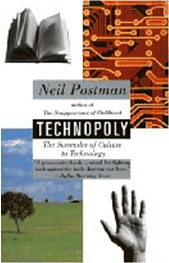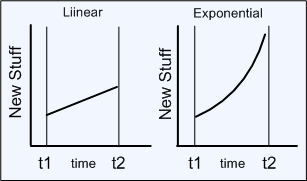

 |  |
|
Technopoly
|
Please go to the new Coffee Coaster site implemented more gracefully in Wordpress. This page: http://brianrwright.com/CoffeeCoasterBlog/?p=3132 |
 Our inventions are wont to be pretty toys, which distract our attention from serious things. They are but improved means to an unimproved end. — Thoreau
Our inventions are wont to be pretty toys, which distract our attention from serious things. They are but improved means to an unimproved end. — Thoreau
Neil Postman is the prophet of the Second Enlightenment, the one that "builds a bridge" to
the First Enlightenment of the 18th century. The former chair of the department of communications arts and sciences at New York University has a thing about technology and language. Reading any of his books—and I did review his Building a Bridge to the 18th Century—gives one the pure joy of
seeing a first-class literary mind wrestling conceptually with the neverending stimulus-response "stuff" coming at humankind through the unchecked machinery of wretched excess.
What's to blame that technology seems out of control, or that technology becomes overwhelming?
Well, Dr. Postman would be the first to admit it's a messy process coming to grips with the new, with "change," especially today when the rate of change is hurtling at us exponentially. Kurzweil, in the Singularity is Near, makes the point that most of us in the Baby Boomer generation and earlier—Postman was born in 1931, so technically he's part of the the Tom Brokaw so-called Greatest Generation—think of the world changing in a linear fashion or the graphic on the left below. If only that were true!
 In fact the world is changing as the
Exponential relationship shown on the right hand side of the figure. In other words, for many people, the rate of change is higher than they can handle. Consider that a substantial percentage of people in the world have never been close to a video monitor... and in technological societies like the US, television is the pinnacle of technology for most of the Greatest Generation. "We don't want no stinkin' Internet: what happened to Walter Cronkite?"
In fact the world is changing as the
Exponential relationship shown on the right hand side of the figure. In other words, for many people, the rate of change is higher than they can handle. Consider that a substantial percentage of people in the world have never been close to a video monitor... and in technological societies like the US, television is the pinnacle of technology for most of the Greatest Generation. "We don't want no stinkin' Internet: what happened to Walter Cronkite?"
But Postman's issue isn't so much about the quantity of change—which is plenty scary by itself—as the quality of change. Or more accurately the nature of all the technology that seems to get rammed down our throats without us having any sayso. He's all for for asserting humanity over the tools. [In 18th Century, he is quoted to the effect: "What is the genuine human problem that the supersonic transport (SST) Concorde (airplane) solves?"]
He also makes apparent that the technologies we incorporate in our civilization become part of our "religion," our way of looking at the world:
"... We may say further that all tool-using cultures—from the technologically most primitive to the most sophisticated—are theocratic or, if not that, unified by some metaphysical theory. Such a theology or metaphysics provides order and meaning to existence, making it almost impossible for the technics to subordinate people to its own needs."
... at least until recently. Postman goes on to describe how sometimes technology overwhelms the metaphysics of a culture, even causing it to lose its moorings and self-destruct. We can particularly see such consequence many times when one culture meets another—a book I reviewed, Guns, Germs, and Steel recounts how a handful of Spaniards with horses, armor, and guns (and some treachery with the Inca emperor) defeated an army of 80,000 men... which led, through additional Spanish arrivals, to subjugation and death of the Inca culture.
But in the modern era, are we not a little anxious of letting the genie out of the bottle of nanotechnology and artificial intelligence? I, who used to relish the full flowering of all such futuristic vision, find myself drawing up lately. Not because I wish to prolong human suffering and human biological deterioration, but I'm afraid that that kind of power in the hands of an immature species—which I'm afraid we will be at least until the nonaggression principle goes viral—might end us. For the time being, it's bad enough being bombarded by commercial television and radio.
Neil Postman isn't so cognizant of the life extension/enhancement technology—Technopoly is copyrighted 1992—as he is of the whole changing of the guard from conceptual-literary print culture to emotional-perceptual video culture. He also brings up several cases of more academically focused sorts of drum beaters for technology über alles, e.g. attempts to quantify intelligence, the idea that humans conforming to machinery is scientific, and the apotheosis of "impartial unattributed scientific studies."
Reading Postman's works I feel two conflicting emotions:
1) A shared strong affinity for the Enlightenment and its many heroes, including, particularly, sublime writers Thomas Jefferson and Thomas Paine, and the whole wondrous lingo of the Rights of Man. Here's a passage from page 66 of Technopoly:
"We need not hesitate to claim that the First Amendment to the United States Constitution stands as a monument to the ideological biases of print. It says, "Congress shall make no law respecting the establishment of religion, or prohibiting the free exercise thereof; or abridging the freedom of speech or of the press; or of the right of the people to peaceably to assemble, and to petition the government for a redress of grievances." In these 45 words we may find the fundamental values of the literate, reasoning mind as fostered by the print revolution:
Such principles are the foundation of liberal society—where liberal means what it should mean, a secular libertarian system with a small government that acts to protect individual rights and thwart privilege.[1] Reading Postman's lofty ideals, then continuing along and grasping his political pessimism, I have a sad realization that Postman is stuck in a conundrum that gives to me the negative side of the emotional conflict:
2) A profound worry that the Postmans of the world, by thinking that the virtues of the Enlightenment are no longer viable, lack the courage to insist on their restoration. Postman seems to be saying in much of his prose, "Sure, a society based on rights, as inviolable conceptual principles, would be nice. But it's so remote from how people 'think' these days, they'll probably kill anyone who stands up for them. So, count me out."
But Postman's insights on the importance of keeping humanity in the driver's seat relative to technology are useful to liberty. How often has the government justified everything from industrial pollution to military adventures by appealing to technological progress. Postman emphasizes that progress cannot be the sole focus; further, it is often not progress.
Neil Postman does seem somewhat a revolutionary, and probably would fit the paradigms of natural liberty quite easily. According to his Wikipedia article, Dr. Postman collaborated with New Rochelle, NY, educator Alan Shapiro on the development of a model school based on the principles expressed in Teaching as a Subversive Activity. Now, that's the kind of revolutionary spirit that floats my boat. It's unfortunate I never had the chance to meet him, but I have learned so much from his books, and will continue to mine that gold.
Technopoly is rich with knowledge. Again from the Wikipedia article:
Neil Postman defines “Technopoly” as a society that believes that “the primary, if not the only, goal of human labor and thought is efficiency, that technical calculation is in all respects superior to human judgment ... and that the affairs of citizens are best guided and conducted by experts.”
Postman argues that the United States is the only country to have developed into a technopoly. He claims that the U.S. has been inundated with technophiles who do not see the downside of technology. This is dangerous because technophiles want more technology and thus more information. However, according to Postman, it is impossible for a technological innovation to have only a one-sided effect.
With the ever-increasing amount of information available Postman argues that: 'Information has become a form of garbage, not only incapable of answering the most fundamental human questions but barely useful in providing coherent direction to the solution of even mundane problems.' (p. 69)
So read Technopoly, read 18th Century, read Postman. Then let's learn to subordinate technology to culture, not the other way around. Moreover, let that be a culture of voluntary community and liberty.
###
[1] I mean privilege in its Latin origin: private law. Not good. It's as important to fight privilege for the masses as it is to fight privilege for the elites... it's just most governments work the elite corner, because "that's where the money is."

Click banner to order, click here for book review
 |
 |
|||